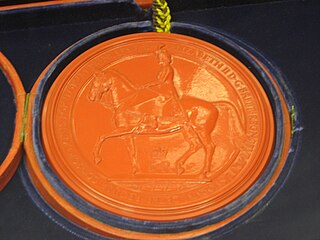
The Hail Mary is a traditional Christian prayer addressing Mary, the mother of Jesus. The prayer is based on two biblical episodes featured in the Gospel of Luke: the Angel Gabriel's visit to Mary, and Mary's subsequent visit to Elisabeth, the mother of John the Baptist. The Hail Mary is a prayer of praise for and of petition to Mary, regarded as the Theotokos. Since the 16th century, the version of the prayer used in the Catholic Church closes with an appeal for her intercession. The prayer takes different forms in various traditions, and has often been set to music.

The British florin, or two-shilling coin, was issued from 1849 until 1967, with a final issue for collectors dated 1970. Equivalent in value to one-tenth of a pound, it was the last coin circulating immediately prior to decimalisation to be demonetised, in 1993, having for a quarter of a century circulated alongside the ten-pence piece, identical in specifications and value.
The five solae of the Protestant Reformation are a foundational set of Christian theological principles held by theologians and clergy to be central to the doctrines of justification and salvation as taught by the Reformed and Lutheran branches of Protestantism and Pentecostalism. Each sola represents a key belief in these Protestant traditions in contradistinction to the theological doctrine of the Catholic Church, although they were not assembled as a theological unit until the 20th century. The Reformers are known to have only clearly stated two of the five solae. Even today there are differences as to what constitutes the solae and how many there are, not to mention how to interpret them to reflect the Reformers' beliefs.

The Great Seal of the Realm or Great Seal of the United Kingdom is a seal that is used to symbolise the Sovereign's approval of state documents.
Dei Gratia Regina is a Latin title meaning By the Grace of God, Queen. The male equivalent is Dei Gratia Rex meaning By the Grace of God, King.
By the Grace of God is a formulaic phrase acknowledging fealty to God. It has its origins as a paraphrase from St. Paul in the Bible, 1 Corinthians 15:8–10, which states, "Last of all, as to one born abnormally, he appeared to me. For I am the least of the apostles, not fit to be called an apostle, because I persecuted the church of God. But by the grace of God I am what I am...".

The style of the Scottish sovereign refers to the styles and forms of address used by Scottish royalty, specifically the monarchs of Scotland from the earliest times until the present, including monarchs from the Pictish period to the British period.

The Vietnam Medal was a joint Australian and New Zealand campaign medal awarded for service in the Vietnam War.

The Agincourt Carol is an English folk song written some time in the early 15th century. It recounts the 1415 Battle of Agincourt, in which the English army led by Henry V of England defeated that of the French Charles VI in what is now the Pas-de-Calais region of France.
The Royal Titles Act 1953 is an Act of the Parliament of the United Kingdom. It authorizes the Queen to alter her style and titles for the United Kingdom as well as territories whose foreign relations are under the responsibility of Her Majesty's Government in the United Kingdom.
"Angelus ad virginem" is a medieval carol whose text is a poetic version of the Hail Mary and the Annunciation by the archangel Gabriel to the Virgin Mary.
Dei Gratia was a Canadian brigantine built in Bear River, Nova Scotia in 1871. The brigantine was named after the Latin phrase for "By the Grace of God". Dei Gratia became famous in 1872 when, under the command of David Reed Morehouse, she discovered the mystery ship Mary Celeste found sailing abandoned without any crew near the Azores. Morehouse and his crew took the derelict Mary Celeste to Gibraltar and claimed the brigantine as salvage. They were at first subjected to suspicion by Gilbraltar's Attorney General, but the Vice Admiralty Court later approved their salvage and commended the crew of Dei Gratia for their resourcefulness and courage. The salvage award for recovering the mysterious brigantine of about $8,300 was diminished by the high court costs of the long inquiry.
Sola gratia, meaning by grace alone, is one of the five solae and consists in the belief that salvation comes by divine grace or "unmerited favor" only, not as something earned or deserved by the sinner. It is a Christian theological doctrine held by some Protestant Christian denominations, in particular the Lutheran and Reformed traditions of Protestantism, propounded to summarise the Protestant Reformers' basic soteriology during the Reformation.

The coat of arms of the London Borough of Barking and Dagenham is the official coat of arms of the London Borough of Barking and Dagenham, granted on 1 September 1965.
But for the Grace of God or There But for the Grace of God may refer to:
This page is based on this
Wikipedia article Text is available under the
CC BY-SA 4.0 license; additional terms may apply.
Images, videos and audio are available under their respective licenses.






